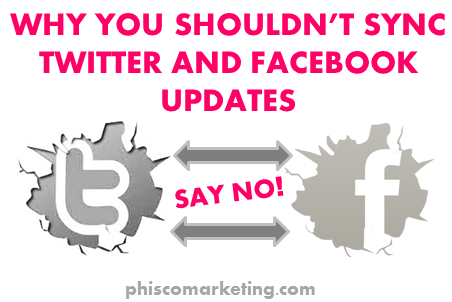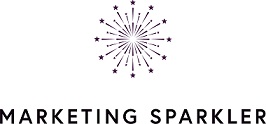Do your tweets automatically post to your Facebook account?
Do your Facebook updates automatically post to Twitter?
If you answered yes to either of these questions, there is no easy way to say this, so I’ll just say it:
Please do not sync your Twitter and Facebook updates.
I know it’s a time saver, but the benefits of using social media are more important than just saving time. Each platform has its own set of users, language, and unwritten rules. If you’re most concerned with saving time, you are missing out on the point of using social media as a marketing tool for your business.
Twitter and Facebook are two different channels with different audiences and different purposes. Yes, most of your content will work on both platforms, but that content needs to be tweaked to fit the channel in order for it to be fully effective.

What’s Wrong with Automatically Posting Facebook Updates to Twitter?
The biggest dilemma is the character count. You have a lot more to work with on Facebook than you do Twitter. So what happens when you go over Twitter’s 140 character count when you have your Facebook updates automatically sent to Twitter?
- The message is cut off and a link to the original Facebook post is created.
- Twitter users are forced to click over to Facebook to see the entire update.
This is soooo annoying! If we wanted to be on Facebook, we would be on Facebook.
And oftentimes, the first 120 or so characters of your Facebook post don’t tease people enough to even want to click on the Facebook link to continue reading. You don’t write the same when you don’t have to count characters.
But do you want to know what irks me the most when people sync updates from Facebook to Twitter? It’s when I see either of these tweets:
- a tweet that’s simply a Facebook link, with no pretext, or
- a tweet that says “I uploaded a photo to Facebook” and then there’s a Facebook link.
Who cares? I mean seriously?! I can almost guarantee nobody on Twitter cares that you just uploaded a photo on Facebook. And a tweet with just a link and no explanation is about as tacky and absent-minded as you can get!
This tells me (as a real Twitter fan) that you don’t care to interact with me on Twitter, you only created an account because of peer pressure, to be one of the cool kids. If you’re not going to talk to me on Twitter, why should I follow you here? Chew on that for a minute.
What’s Wrong with Automatically Posting Twitter Updates to Facebook?
So, you’ll just reverse engineer this problem, and sync and post your Twitter updates directly to your Facebook account. That way you won’t go over any character counts and everything is fine, right?
Ugh, no! You’re putting limitations on your content for no reason, and, again, is annoying.
You’re missing a big piece of the problem here: Facebook and Twitter are not equals. They weren’t created to sync together. Each platform have its own culture, functions and layouts.
- Twitter and Facebook are not twins. People use them differently and for different reasons, and each will work best for you if you use them in different ways.
- Even though Facebook has now added its own hashtag feature, it isn’t nearly as robust as Twitter’s. Facebook still has some work to do in the hashtag department.
- If you participate in any Twitter chats, that hashtag will mean nothing to your Facebook followers.
- Any retweets will show up on your Facebook feed with the letters “RT” and some random @username very few people will know included. Twitter mentions will also only show one part of a conversation, leaving your Facebook fans left out of the context. @username means nothing on Facebook.
More Key Differences
- Visuals: Facebook is a much more visual space than Twitter. Graphics, pictures, and other images work really well on Facebook.
- Speed: Twitter feed flows at a frantic pace. All of your conversations are part of your feed. In contrast, on Facebook, you reply to comments within a single thread as opposed to starting a new update for every comment.
- Users: Facebook users log in to check in with their friends and their favorite brands. Twitter users log in to find out what’s happening now with their network AND the world.
You don’t have to come up with completely different content for each network. You just need to adjust the update itself based on which one you are using.
Ok, but I don’t have time to create new content for each platform.
So what am I supposed to do?
First, stop saying you don’t have time to meet and connect with your audience. Throwing up your hands with the “I don’t have time so I’ll just copy and paste and sync everything” does nothing to solve the problem.
So here’s an easy fix:
Post the same subject, but modify it just a bit to work better for the social network you’re posting to. If you’re posting it to Twitter, you’re usually abbreviating, eliminating words for brevity, etc.
Now, take that same subject you want to share, and write it in full for Facebook.
BAM! It’s that simple.
It doesn’t take that much extra time to create a separate update for each network, especially if you’re using tools such as Hootsuite or SproutSocial to schedule your updates. You’ll show your followers you understand the social networks you are using as well as respect their favored choice.
And isn’t that the point of talking to your followers on social media? So go ahead and un-sync your Facebook and Twitter accounts please.
On behalf of your Twitter followers and Facebook fans, I say thank you!
Ciao,
Miss Kemya
So have I convinced you to un-synchronize your Twitter and Facebook updates? Or did you already know this, and now you’re sending this blog to your friends that don’t get it?


I agree wholeheartedly!
We need to spread the word Bridget! Thanks for stopping by:)
[…] it’s not just the formatting; there are other reasons why linking accounts is bad. […]
[…] Facebook feeds. #Annoying. #Unfollow. But it’s not just the formatting; there are other reasons why linking accounts is bad. […]
I agree with this one. They demand different types of posts and interaction levels. I’ve also read that Facebook hates this sort of thing that it doesn’t want to show anybody posts that are automatically posted like this. I know I had a friend who used to do it and I stopped following her page completely. If I want to read her Twitter posts, I’ll read them on Twitter.
Good advice!
(P.S. I’m one of your SITS Tribe members)
Thanks Rozanne! I say the same thing, and I will never click a Facebook link if I’m on Twitter. I’ve started unfollowing a few people who autosync, I don’t feel like they want to engage me at all. Nice to meet you!
Woooosahhh…. Okay fine you win! I won’t do it anymore but really I try to do it with just my photos. I feel like people want visuals everywhere and that’s what I try to give them. Maybe I over do it (should probably stick to IG) I’ll try it your way. I will also share this post because many people do the same thing!
Hahaha, score! If you really just want to share the photos, you can sync your Instagram to both Twitter and Facebook, like many people do. That should help. And thanks for commenting and sharing!
Having a great discussion on the “Exception to the rule” of connecting Twitter and Facebook. While, I agree that connecting them’s a mostly fruitless endeavor. There are certain instances where it’s a necessary “evil”. Again, I don’t recommend the majority connect them. It’s just not a good idea… UNLESS, you are only planning to do it as awareness to other places found, and topics/content shared. Maybe for a month, then, disconnect, and laser focus your content specifically to each platform. This direct connection May be most important when first creating an account on either platform. You need all the exposure you can get. To let people know and see that you are active on there. But, once established, it’s time to disconnect, and get FOCUSED.
So true Stephen, once you’re established and understand the nuances of each platform, you should disconnect the platforms and focus your content and engagement separately. Thanks for commenting and sharing your perspective!
Thanks for this post. I used to automatically post to Facebook and Twitter and came up against the exact problem you talk about. I decided to post separately and now write for Facebook and write something shorter and punchier for Twitter. I also learnt recently that people interact differently on these two social media platforms. Facebook is of course more visual – pictures, videos etc and Twitter – quick sound bites and faster feeds. Thanks again. I will definitely share this post.
Bravo for understanding the importance of separation Sonia! I love what you said, “write something shorter and punchier for Twitter” – that’s exactly what Twitter users want to read. Thanks for commenting and sharing!
Totally sharing this post everywhere because this needs to be understood. It’s SO annoying to see on Twitter, a Facebook update you can’t even read. I’m not leaving Twitter to go to Facebook just to read it…why should I? I’m on Twitter…lol
Love this post!
Thanks Tamyka! I know I’m not the only one who gets annoyed by this. People don’t realize most tweets on Facebook just look ridiculous, and it makes me not want to follow people on both platforms. I never click Facebook links on Twitter because I don’t want to be on Facebook, I’m on Twitter. If only we could get people to understand…